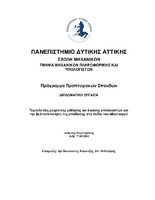| dc.contributor.advisor | Karkazis, Panagiotis | |
| dc.contributor.author | Καμπεράκης, Ιωάννης | |
| dc.date.accessioned | 2022-03-21T10:48:07Z | |
| dc.date.available | 2022-03-21T10:48:07Z | |
| dc.date.issued | 2022-03-11 | |
| dc.identifier.uri | https://polynoe.lib.uniwa.gr/xmlui/handle/11400/1938 | |
| dc.identifier.uri | http://dx.doi.org/10.26265/polynoe-1789 | |
| dc.description.abstract | O όρος της Τεχνητής Νοημοσύνης έχει γίνει γνωστός σε όλο τον κόσμο. Ακούμε συνέχεια για τα έξυπνα κινητά, τα έξυπνα σπίτια, τις έξυπνες τηλεοράσεις και γενικά από συσκευές και υπολογιστικά συστήματα που παρέχουν ευφυείς υπηρεσίες. Δεν γίνεται πλήρως αντιληπτό όμως ότι ο τίτλος «έξυπνος» που έχει δοθεί πλέον στις συσκευές, οφείλεται κυρίως στην ανάπτυξη της Τεχνητής Νοημοσύνης και την ενσωμάτωσή της στην καθημερινότητα του ανθρώπου. Οι δυνατότητες της Τεχνητής Νοημοσύνης και οι τομείς που μπορεί να χρησιμοποιηθεί αυξάνονται συνεχώς. Βρισκόμαστε στην εποχή όπου οι επιστήμονες συνειδητοποιούν τις προοπτικές και την διευκόλυνση που μπορούν να μας παρέχουν οι έξυπνες συσκευές, γι’ αυτό και έχει ξεκινήσει η εντατική παραγωγή ευφυών υπολογιστικών συστημάτων και η δημιουργία λογισμικών που μαθαίνουν από τα δεδομένα που παράγονται καθημερινά. Στο πλαίσιο αυτής της διπλωματικής, δημιουργείται ένα μοντέλο με την χρήση αλγορίθμων Μηχανικής Μάθησης και Όρασης Υπολογιστών, το οποίο είναι εκπαιδευμένο με βάση ένα σύνολο από βίντεο ελεύθερων βολών ενός ανθρώπου Α και ένας άνθρωπος Β τροφοδοτεί το βίντεο του στο μοντέλο για να δει κατά πόσο είναι σωστή η τεχνική της ελεύθερης βολής του σύμφωνα με την τεχνική του Α. | el |
| dc.format.extent | 80 | el |
| dc.language.iso | el | el |
| dc.publisher | Πανεπιστήμιο Δυτικής Αττικής | el |
| dc.rights | Αναφορά Δημιουργού - Μη Εμπορική Χρήση - Παρόμοια Διανομή 4.0 Διεθνές | * |
| dc.rights | Αναφορά Δημιουργού - Παρόμοια Διανομή 4.0 Διεθνές | * |
| dc.rights.uri | http://creativecommons.org/licenses/by-sa/4.0/ | * |
| dc.subject | Μηχανική μάθηση | el |
| dc.subject | Όραση υπολογιστών | el |
| dc.subject | Τεχνητή νοημοσύνη | el |
| dc.subject | Νευρωνικά δίκτυα | el |
| dc.subject | Βαθιά μάθηση | el |
| dc.subject | Επεξεργασία φυσικής γλώσσας | el |
| dc.subject | Γνωστική υπολογιστική | el |
| dc.subject | Δεδομένα | el |
| dc.subject | Βελτιστοποίηση αθλητικής απόδοσης | el |
| dc.subject | Εκπαίδευση | el |
| dc.subject | Ευφυή | el |
| dc.subject | Μοντέλο | el |
| dc.subject | Έξυπνες συσκευές | el |
| dc.subject | Ανάλυση δεδομένων | el |
| dc.subject | Machine learning | el |
| dc.subject | Computer vision | el |
| dc.subject | Artificial intelligence | el |
| dc.subject | Neural networks | el |
| dc.subject | Deep learning | el |
| dc.subject | Natural language processing | el |
| dc.subject | Cognitive computing | el |
| dc.subject | Data | el |
| dc.subject | Athletic performance optimization | el |
| dc.subject | Training | el |
| dc.subject | Intelligent | el |
| dc.subject | Model | el |
| dc.subject | Smart devices | el |
| dc.subject | Data analysis | el |
| dc.title | Τεχνολογίες μηχανικής μάθησης και όρασης υπολογιστών για την βελτιστοποίηση της απόδοσης στο πεδίο του αθλητισμού | el |
| dc.title.alternative | Technologies of machine learning and computer vision for the optimization of the athletic performance | el |
| dc.type | Διπλωματική εργασία | el |
| dc.contributor.committee | Μυριδάκης, Νικόλαος | |
| dc.contributor.committee | Mamalis, Basilis | |
| dc.contributor.faculty | Σχολή Μηχανικών | el |
| dc.contributor.department | Τμήμα Μηχανικών Πληροφορικής και Υπολογιστών | el |
| dc.description.abstracttranslated | The term Artificial Intelligence has become known throughout the world. We hear constantly about smart phones, smart homes, smart TVs and generally from devices and computer systems that provide intelligent services. However, it is not fully understood that the title "smart" that has now been given to devices, is mainly due to the development of Artificial Intelligence and its integration into everyday life. The capabilities of Artificial Intelligence and the areas that can be used are constantly increasing. We are in a time where scientists are realizing the prospects and convenience that smart devices can provide us, which is why intensive production of intelligent computing systems and the creation of software that learns from the data produced daily has begun. As part of this dissertation, a model is created using Machine Learning and Computer Vision algorithms, which is trained based on a set of free-shooting videos of a person A and a person B which feeds his video to the model to see if it is the technique of his free throw is correct according to the technique of A. | el |


